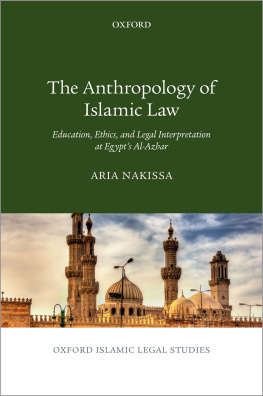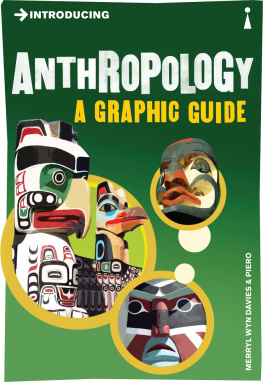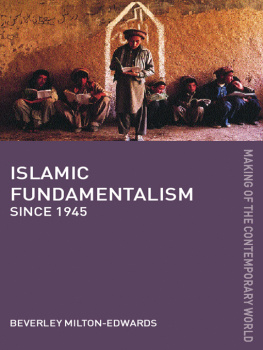Nakissa Aria - The Anthropology of Islamic Law
Here you can read online Nakissa Aria - The Anthropology of Islamic Law full text of the book (entire story) in english for free. Download pdf and epub, get meaning, cover and reviews about this ebook. year: 2019, publisher: Oxford University Press USA - OSO, genre: Religion. Description of the work, (preface) as well as reviews are available. Best literature library LitArk.com created for fans of good reading and offers a wide selection of genres:
Romance novel
Science fiction
Adventure
Detective
Science
History
Home and family
Prose
Art
Politics
Computer
Non-fiction
Religion
Business
Children
Humor
Choose a favorite category and find really read worthwhile books. Enjoy immersion in the world of imagination, feel the emotions of the characters or learn something new for yourself, make an fascinating discovery.
- Book:The Anthropology of Islamic Law
- Author:
- Publisher:Oxford University Press USA - OSO
- Genre:
- Year:2019
- Rating:3 / 5
- Favourites:Add to favourites
- Your mark:
- 60
- 1
- 2
- 3
- 4
- 5
The Anthropology of Islamic Law: summary, description and annotation
We offer to read an annotation, description, summary or preface (depends on what the author of the book "The Anthropology of Islamic Law" wrote himself). If you haven't found the necessary information about the book — write in the comments, we will try to find it.
The Anthropology of Islamic Law — read online for free the complete book (whole text) full work
Below is the text of the book, divided by pages. System saving the place of the last page read, allows you to conveniently read the book "The Anthropology of Islamic Law" online for free, without having to search again every time where you left off. Put a bookmark, and you can go to the page where you finished reading at any time.
Font size:
Interval:
Bookmark:

OXFORD ISLAMIC LEGAL STUDIES
Series Editors:
Anver M. Emon, Clark Lombardi, and Lynn Welchman
OXFORD ISLAMIC LEGAL STUDIES
Series Editors:
Anver M. Emon, Clark Lombardi, and Lynn Welchman
Satisfying the growing interest in Islam and Islamic law, the Oxford Islamic Legal Studies series speaks to both specialists and those interested in the study of a legal tradition that shapes lives and societies across the globe. Islamic law operates at several levels. It shapes private decision making, binds communities, and it is also imposed by states as domestic positive law. The series features innovative and interdisciplinary studies that explore Islamic law as it operates at each of these levels. The series also sheds new light on the history and jurisprudence of Islamic law and provides for a richer understanding of the state of Islamic law in the contemporary Muslim world, including parts of the world where Muslims are minorities.
ALSO AVAILABLE IN THE SERIES:
The Legal Thought of Jall al-Dn al-Suy
Authority and Legacy
Rebecca Hernandez
Coercion and Responsibility in Islam
A Study in Ethics and Law
Mairaj U. Syed
Islamic Legal Revival
Reception of European Law and Transformations in Islamic Legal Thought in Egypt, 18751952
Leonard Wood
Sharia and Muslim Minorities
The Wasati and Salafi Approaches to Fiqh al-aqalliyyat al-Muslima
Uriya Shavit
Domestic Violence and the Islamic Tradition
Ayesha S. Chaudhry
Sharia and Social Engineering
The Implementation of Islamic Law in Contemporary Aceh, Indonesia
R. Michael Feener
Religious Pluralism and Islamic Law
Dhimmis and Others in the Empire Law
Anver M. Emon
Narratives of Islamic Legal Theory
Rumee Ahmed

Oxford University Press is a department of the University of Oxford. It furthers the Universitys objective of excellence in research, scholarship, and education by publishing worldwide. Oxford is a registered trademark of Oxford University Press in the UK and certain other countries.
Published in the United States of America by Oxford University Press
198 Madison Avenue, New York, NY 10016, United States of America.
Aria Nakissa 2019
All rights reserved. No part of this publication may be reproduced, stored in a retrieval system, or transmitted, in any form or by any means, without the prior permission in writing of Oxford University Press, or as expressly permitted by law, by license, or under terms agreed with the appropriate reproduction rights organization. Inquiries concerning reproduction outside the scope of the above should be sent to the Rights Department, Oxford University Press, at the address above.
You must not circulate this work in any other form and you must impose this same condition on any acquirer.
Library of Congress Cataloging-in-Publication Data
Names: Nakissa, Aria, author.
Title: The anthropology of Islamic law : education, ethics, and legal interpretation at Egypts al-Azhar / Aria Nakissa.
Description: New York : Oxford University Press, 2019. | Based on authors thesis in cultural anthropology (doctoralHarvard University, 2012) issued under title: Islamic law and legal education in modern Egypt. | Includes bibliographical references and index.
Identifiers: LCCN 2018048553 | ISBN 9780190932886 ((hardback) : alk. paper) | ISBN 9780190932909 (epub)
Subjects: LCSH: Jami at al-Azhar. | Islamic lawStudy and teaching. | Islamic lawEgypt.
Classification: LCC KBP43.E32 J36 2019 | DDC 297.1/40181dc23
LC record available at https://lccn.loc.gov/2018048553
Note to Readers
This publication is designed to provide accurate and authoritative information in regard to the subject matter covered. It is based upon sources believed to be accurate and reliable and is intended to be current as of the time it was written. It is sold with the understanding that the publisher is not engaged in rendering legal, accounting, or other professional services. If legal advice or other expert assistance is required, the services of a competent professional person should be sought. Also, to confirm that the information has not been affected or changed by recent developments, traditional legal research techniques should be used, including checking primary sources where appropriate.
(Based on the Declaration of Principles jointly adopted by a Committee of theAmerican Bar Association and a Committee of Publishers and Associations.)
You may order this or any other Oxford University Press publicationby visiting the Oxford University Press website at www.oup.com.
The Oxford Islamic Legal Studies Series is pleased to include Aria Nakissas The Anthropology of Islamic Law among its lauded list of monographs. Nakissas monograph is an important study that blends two distinct disciplinary approaches to the study of Islam. Historically, the study of Islam and Islamic law (especially in North America) has been framed by the poles of philology on the one hand, and anthropology on the other. The former informs the curriculum of long-standing area studies programs, whereas the latter has increasingly informed the curriculum, training, and production of knowledge in religious studies departments. The two disciplinary vantage points present distinct orientations and starting points in the study of Islam and Islamic law.
Nakissas study is an attempt to bring the two approaches together. Through a close study of Islamic law as taught in the seminary classroom, Nakissa not only illuminates a specific environment of teaching, training, and knowledge transmission, but also interrogates the disciplinary formation of Islamic legal studies as a subfield of study and research. He blends a rich and deliberate ethnographic account of seminary training in al-Azhar, a major Sunni institution of learning, with close readings of the texts taught in those classrooms. His ethnographic account integrates the texts from which al-Azhars instructors teach. By locating his ethnography in the classroom, Nakissa brings together ethnography with text-based analysis to perform a composite study that, by this very characteristic, makes his study an important contribution to advanced research on Islamic legal studies.
Anver M. Emon
Clark B. Lombardi
Lynn Welchman
Like any human work, I know that this book is not free from error. I ask the reader to forgive my ignorance. Whatever insights this text contains have only been possible through the help and guidance of others. I would like to take this opportunity to thank them.
First, I would like to express my gratitude to the Islamic scholars of Egypt and Malaysia. I have learned so much from all of them. Special thanks are due to Shaykh abb al-Ramn Mohtisham, Shaykh Ysir Fahm, Professor Muammad al-hir al-Msw, Professor Ibrhm Zayn, Shaykh Sal asan Manr, and Professor Muammad al-Dusq.
Second, I wish to thank all those who have given generously of their time and expertise to help me improve the manuscript at various stages of its development. These include Baber Johansen, Talal Asad, Arzoo Osanloo, Asad Ahmed, Morgan Liu, Malika Zeghal, David Powers, Flagg Miller, Carl Sharif El-Tobgui, Daniel Reza Jou, Payam Mohseni, Jonathan Brown, Aron Zysow, Hussein Agrama, Nada Moumtaz, Charles Hirschkind, and Andrew Shryock. Although my views are not always in agreement with these scholars, I owe a deep intellectual debt to all of them.
Font size:
Interval:
Bookmark:
Similar books «The Anthropology of Islamic Law»
Look at similar books to The Anthropology of Islamic Law. We have selected literature similar in name and meaning in the hope of providing readers with more options to find new, interesting, not yet read works.
Discussion, reviews of the book The Anthropology of Islamic Law and just readers' own opinions. Leave your comments, write what you think about the work, its meaning or the main characters. Specify what exactly you liked and what you didn't like, and why you think so.











